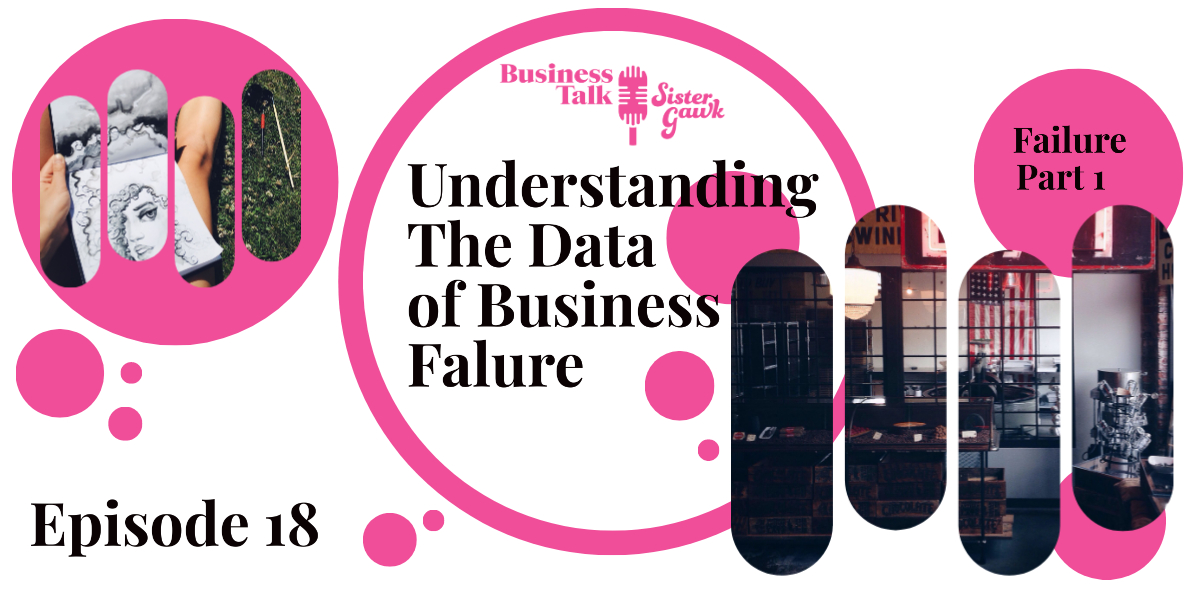In this episode, we start a 3 part series on the topic of failure. Within this episode we discuss business failure and how to prepare for a good business by knowing data and how it is collected. From sample size to industry specific statistics, we help you to know how you can navigate the data that’s around you and use it to your advantage while planning a business so that you will not be a failure statistic.
Why People Do and Don’t Start Businesses
Bekkah: Today we’re specifically going to be digging into some data research and insecurities behind people starting businesses or why people don’t start them. Data is super important to me, personally. It’s near and dear to my heart because if I know what statistically is practical, it allows me the confidence to move forward. Or just a complete change of course and what I set about to do. Some of the information that we’ve been researching for this topic I’ve also looked into a little bit already in the past. Ruthie is going to share a little bit of what she’s been finding and she’s going to give us some ideas for how to understand researching statistics, as well.
Ruthie: Basically, I was finding across the board people vary a lot in the statistics that they’re producing and reporting. What’s really important when you’re looking at those statistics and those studies that people have done on small businesses is to look at the sample size that they have. If somebody only polls like 20 people or 10 people and then they say, “90% of people do not have successful businesses.” But maybe they interviewed people that they know or the sample size is not necessarily indicative of the whole nation or what that would mean for your industry.
Look at Business Data By Industry to Understand True Business Failure
It’s really important to break it down by industry as well as having a large sample size when you look at those statistics. It’s really hard to be able to pull those numbers accurately if there is a large bias in the question that the researcher is asking. If it’s really opinions based. Keep that in mind when you’re looking at different statistics but one of the articles that I found that I thought was really interesting and had a lot of really sobering statistics but at the same time also very hopeful. It’s from Fortunly.com. The first line item that they had here was that only 78.5% of small businesses survived that first year. They go on to talk about how 21.5% of small businesses don’t make it past the first year, basically so that 78% do make it past. When you think about that it is actually very encouraging when thinking about the reasons that those small businesses didn’t succeed.
There are a lot of different reasons why small businesses might not succeed. One is that they lose focus. They’re not investing in themselves or in the company. Be encouraged that you listen to this podcast shows that you care about your business. You’re working on your business and trying to find ways to improve it. Statistically, a lot of the small businesses that end is not doing that. They’re not finding ways that they can be become more financially efficient or cut back on cost or find ways that they can do things cheaply or free. Really investing in themselves that way.
Another thing that I think is really encouraging that was also from this article is that the small business failure rate has declined by 30% since 1977. Basically what we’re seeing is this trend of small businesses. Yes, things are kind of crazy right now with COVID-19, and there are a lot of people who are really struggling but, on the whole, we’ve seen so many more small businesses come out of difficult situations. In the long haul, we’ve seen a lot of businesses succeed.
Small Businesses Can Still Pivot Into New Industry To Succeed
I was listening to a video that Dave Ramsey put out recently. He was talking about when refrigerators were invented the ice industry freaked out. Many people backed out of the ice industry. They used to bring ice, have iceboxes, and deliver ice to people. Basically, what this major ice producer did is he got into picnic ice and things like that. Talking about the statistics of staying on the ball and going through that. Fighting through it and finding ways to pivot in your business. What can we be doing to capitalize on this current situation?
Bekkah: I think the word “pivot” is something not a lot of people think about. When I think about the word “pivot”, I think of basketball when you can only have one foot on the ground or you’re double dribbling. Besides the point, but think of going one way and then you completely shift gears to go another way. There are tons of stories out there people who pivot their companies to do something completely different.
Just today I was looking through and found a case study about Pay Pal and how the guy started it to basically he wanted to start a Palm Pilot company. He was like so into that and people kept sending him emails and asking him if he could make an integration to make payment through eBay faster or easier. He ignored it for like six months before he actually did something about it. Then he dropped the whole Palm Pilot thing in general. Which was a good move on his part! Half of you probably don’t even know what a Palm Pilot is!
Ruthie: I don’t know what a Palm Pilot is…
Bekkah: Exactly! Think about that. You start a business and think this is what you want to do with your life and then all of a sudden you realize it’s not. But you see that there is a need here, so I’m going to change what I’m doing to meet that need. Just because you started one way and you turn and you’re going another way – yeah you might have failed at seeing that was a bad idea to begin with, but it doesn’t mean that you can’t make something out of it or use what you learned.
The Difference Between Primary Data & Secondary Data
Some of the data that Ruthie was talking about, knowing the sample size and all of that so important. There’s a big difference between primary data and secondary data. Primary data is when you go out and collect it yourself. Or a research report from someone that went out and surveyed a whole bunch of people. If you’ve ever read one of those really complex research reports from doctors or in research journals they’ll say, “Here was the amount of people we did this test on.” Then they have a hypothesis and they figure out all these different things then they say, “We’re going to see if we can prove this true.” The whole aspect that Ruthie was talking about is are your questions biased in what you’re asking. That’s super important.
One time I got a survey in the mail that asked me if I would rather fire the janitor of the school or higher property taxes. I thought, “You made this so personal to me!” Basically you’re saying do you want more property taxes or less property taxes? But you didn’t want to ask me that! You made it so emotional that you said, “Would you like to fire the janitor?” It was a professional company that got hired to send out these surveys. Obviously, everyone within our town is going to think, “Oh don’t fire the janitor!” Duh! Then they’ll take that data and say that 99% of the entire town says they want their taxes raised because they don’t want to fire the janitor! They’re not going to tell you that when they put that information out there. But if you created the survey or you went and polled people and asked them that’s primary data.
Secondary data is when you reference other people. The Fortunly article that Ruthie talked about pulls into one article a whole bunch of data about small business by pulling it from other people that actually did primary research. They basically cited a whole bunch as secondary data to prove their point about small businesses. Thinking about that is very important when we’re thinking about insecurities. The reason for that is I don’t know how many times I have talked to somebody about sales and they think, “Oh, I hate sales because it’s really hard to talk to people. They turn me down or I feel bad asking.” In sales, you know that you’re trying to make money somehow, but when you look at some statistics of sales and people who actually do sales full-time as a primary job you have to have an average five points of contact before someone will even agree to set up a meeting with you in certain industries.
Dig into knowing what industry data is important. That is so valuable because there are certain data on the restaurant industry that is completely unique to that industry. Compared to a different industry like the tech industry. One of the places, in general, when you look at which businesses fail the most, one of the areas was actually tech. I think part of it is because it’s really easy to start with tech if you’re a tech person. You can build something quickly with not a whole lot of cost if you’re building it yourself. But there might already be like four or five other products that come to market at the exact same time. That’s why your business doesn’t do so hot. Or maybe you just didn’t market it well to compete with those businesses. I could see why the rate is higher in that industry because there’s less barrier to entry to get up and started to begin with.
Keeping those things in mind, know what the data is for the type of business that you want to start because you might think that so many businesses fail, but if you make it a year – hotdog! You made it past twenty percent of the people who ever started! That’s a big celebration in itself! I remember a year after I started my business I had a celebration because I was like, “I’ve made it past the first twenty!” It’s like running a marathon and passing all those people!
Small Businesses Fail Because of Incompetence
Bekkah: We have some data that we found from a website called Failory which is actually a podcast by the way. They just started in April they have quite a few interviews and their first episode was probably just as awkward as our first episode. I’m really thankful for a lot of you that stuck with us because let me tell you, starting a podcast brings to the surface some really big insecurities! They have this webpage with an infographic about startup failure rates. Full disclosure, they said that their sample size was a hundred businesses over a fifteen-year time period. When we’re looking at their data of what they pulled together the common characteristics of startups that failed, this can be across the board for pretty much anybody who has a start-up, not just industry-specific. The first one was, no surprise, incompetence! Ruthie, do you want to expand upon what you think that would look like?
Ruthie: Basically, incompetence is exactly what it sounds like. You just don’t know what you’re doing. You don’t know the terms of the industry as they said in the article and business owners have little experience with team and personal problems. One thing that I think is really valuable, if you’re working by yourself know your strengths and your weaknesses. We have talked about this in episodes before. Know what you’re good at and know what you’re bad at! It’s okay to know what you’re bad at and ask people to help you or hire subcontractors for things that you’re bad at. If you are working with a team of people know how to work with those people. Know their strengths and weaknesses. Know how you can work well as a team! It’s so common to have an interpersonal conflict like that.
Right now my little brother and his friends are making a lawn mowing business and that has been just a huge learning curve for everyone I think. I can honestly say that I have never dealt with so many emotions in one day. One moment you’re freaking out you just got paid twenty bucks. The next moment there’s a conflict, then somebody’s crying, and these are little boys. It has been interesting seeing that on a small scale of how their interpersonal communication styles have come to a head in a lot of ways. A piece of that is they’re young! They don’t know that if you don’t work you don’t get paid. Or if you’re gone for a weekend and two of your friends take a job, you don’t get paid for that. It’s not a salary position, you actually have to work to get paid! You know, just little hiccups that you work through when you’re starting know things.
I think that can be more on a larger scale too! Especially, when you’re expanding I think when you have the initial success and you think, “Yeah! Let’s keep doing this! Then you think, “I can just keep doing the same thing over and over again that we’ve done really well!” Then you have to think, “What are ways that we can expand our business?” If you’re not willing to do that, that can really cause issues. But that’s where competence comes in. You think, “Okay this worked but now let’s find other work ways that work.” Or “What works with our organization specifically?”
Bekkah: This will probably be our Gawk as well as our episode of the same time because we were just about to do a recording when they were having their little payday talk about what they invest in the business and what they get paid. Ruthie’s trying to walk them through it and I wanted to press record so badly to play a part of this episode but I wasn’t the host of the meetings I couldn’t. He was getting upset and said, “I’m so mad! We worked for two whole days on this project and we only got paid this much!” Ruthie’s like, “That’s because when people say, ‘How much do you charge?’ You say, ‘Anywhere from $5 to $40’ ” If you say $5 people are just going to pay you $5!
Ruthie: He has been having to work through and figure out how in two days they made around $90. Then yesterday they worked for one day did two yards and got paid $80. He was like, “How did that happen!?” And I said, “Well, the other people were paying $10! The other two yards you got paid forty bucks a yard. I’m just saying! Here we go! Know what you are worth!” There you go! Incompetent! Know what you’re worth. Know what you should be charging and what that should look like for your business. The other thing that he’s learning is how long those things will take him. There is a learning curve for everything.
Know How Much Your Time Is Worth In Your Business
Bekkah: I also think another thing that’s important to understand is the emotional aspect of pricing. If you ask your family members, “Do you think this is worth this much?” First of all, your family can either be really nice to you and lie to your face or they can be really mean to you and say that there’s no way they would pay someone to do that. I don’t necessarily mean actually “mean” but maybe it’s because they also have the same giftings as you do and there’s no way they would pay you to mow their lawn because they can mow it themselves. Whereas other people, that’s not something they really enjoy and they’d be willing to pay for it.
Know the data and who to ask and poll about your product and seeing who would be interested in paying for something or what it would be is so valuable. Ruthie even did a poll a long time ago when she was thinking about starting a different kind of business. She put a poll together on Facebook saying, “If I were to start a business like this what would you be willing to pay for and how much you would you be willing to pay for it?” Then she put different categories of what kind of services would be involved. Then people weighed in and said things like,” I would definitely be interested in this.” She also left an open space for people to add comments of things they would be willing to pay for if it wasn’t even on her services list.
Ruthie: That was really valuable for me to learn about somethings that people might not be willing to pay for and other things that I hadn’t even thought of that they were willing to pay for. That market research on your own part is really helpful. We’re going to get a little bit personal with the Sister Gawk portion of this. It’s silly, it’s frustrating but it’s process.
Pushing Past Insecurity in Starting a Business Podcast
Ruthie: We are going to talk a little bit about what is been like to start this podcast and all the insecurities that have gone into that. All the having to push through that and learn about ourselves and learn about what works for us and what kind of business model we want to have and the meetings we need to have. I’m just going to start and basically lay out my thoughts on that.
For me when we started out I was not as gung-ho as Bekkah which is pretty consistent with a lot of things. Bekkah gets really excited about things and it takes me a lot longer to process them I think. Basically, the first couple of episodes I just had this overwhelming insecurity the whole time thinking, “Why would anybody want to listen to me?” That played a lot into my insecurities in my own business and starting out in financial coaching and having to really develop myself and my skills and how I approach what I do. That also played into our podcast. I remember the first time I made a Facebook video and I posted on my personal Facebook promoting what I was doing as a business as well as what we were doing with this podcast.
I recorded it like 10 times I had sticky notes all over my door trying to get myself geared up to map out what I was going to say and then I was so emotionally distraught! It like it just sounds bad! I don’t know what I’m doing! It was that constant sense of “I don’t know what I’m doing! I don’t know what I’m doing!” But, finally, my phone is about to die. It was at five percent. My screen went dark you know how the power saving mode comes on? I was like, “I just have to do this. I just need to talk like I’m talking to my friend and just do this.” Then I started it, said what he needed to say, stopped it, and right after that my battery died so I didn’t have time to go through and critique myself over and over again.
I think it has been one of the most difficult parts of having a podcast. You have to listen to yourself over and over again when editing when writing subtitles, and just really having to look at what you’re doing is valuable. I think that really comes back to business, again and again, reminding yourself what I do is valuable and what I do is purposeful. I’m working really hard at it and I’m continuing and persevering. That has been my experience with the insecurity side of business.
Bekkah: I’m just dying because I think, caveat! Maybe what you’re doing isn’t valuable because no one’s willing to pay for it and you didn’t do enough research. But what we’re talking about is the learning experience is the valuable part. Just remember that because if you come back to me and you’re like well I couldn’t get these foot popsicles to sell. No one wants to lick a foot! I’m sorry!
Support for our podcast comes from our intern, Darby! She didn’t tell me to say that part. She’s been researching podcasts and told us that we need to have a strong call to action at the end of our podcast.
So here it is: Please tell your friends about our podcast and what you enjoy about it. Join us again next week where we talk about part two of failure and how it’s different for entrepreneurs.




